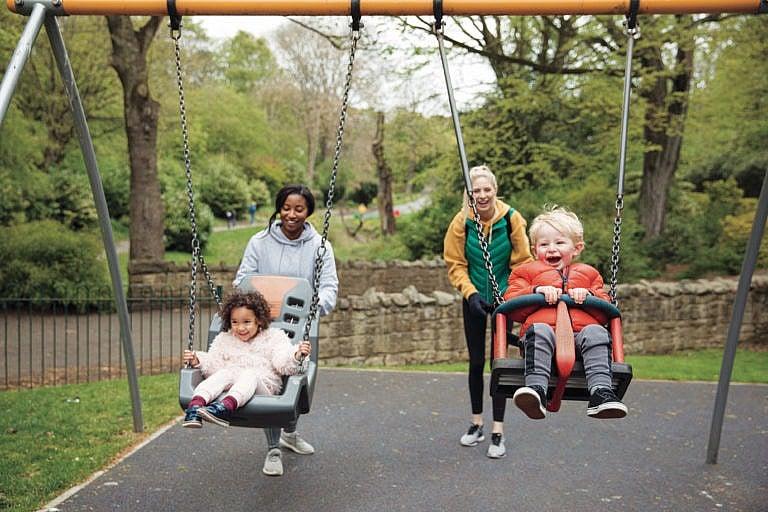A letter to the mom at the playground: Our casual chats meant more than I realized
Amil Niazi: By early May, only 48 per cent of Canadians over the age of 15 reported excellent or very good mental health, down 20 per cent from 2018. The loss of acquaintances may play a role in that shift.

During this pandemic, many of us have had to say farewell to the small connections that were highlights of our day (SolStock/Getty Images)
Share
You have been a small but necessary part of my life for the past two years. We didn’t plan our meetings like I did with my close friends. Instead, we had the luxury of running into each other by chance, letting our children’s playground demands guide our acquaintanceship. We commiserated over the stress of motherhood while watching our children play. Seeing your houndstooth coat peeking out from behind the jungle gym always brought a sigh of relief. Comparing notes on sleep schedules, tantrums, regressions and what books we were pretending to read (but never quite finding the time) often became the highlight of my day.
Or at least it did before COVID-19.
As the pandemic required that we shrink our social circles, casual friendships like ours fell by the wayside. With the need to book gatherings that accommodate public health restrictions, spontaneity disappeared. I find myself contemplating sending you a DM with the hope that we might get the kids together this weekend. Maybe? If the weather holds? Then reality sets in. With a recent study suggesting some Canadian moms have taken on the equivalent of two full-time jobs juggling child care and work, the very idea of an impromptu get-together feels like an impossible fantasy.
READ: A neighbour regrets a pandemic-era scolding: ‘I looked for you, but you’d vanished’
Experts refer to acquaintanceships like ours as “weak ties,” but a 1973 paper by Stanford University sociology professor Mark Granovetter concluded they are anything but. Granovetter argued that casual friendships help connect us to and inform our understanding of the world beyond our close social circles. Before COVID, friendships like ours provided a sense of camaraderie that brightened long commutes or the daily office grind with a smile, a joke or an anecdote about how we spent our weekends. With an estimated 2.5 million Canadians still working from home, those park-side chats and quick catch-ups by the coffee machine have been lost.
According to Harvard sociologist Mario Luis Small, who studies personal networks, we’re also more likely to confide in our acquaintances. In his book Someone to Talk To, Small notes that people “will repeatedly, willingly, and even without much reflection confide deeply personal matters to individuals they are not close to, even to those they barely know.”
You and I don’t know each other well, but that didn’t stop us from being entirely vulnerable with each other—in fact, it may have been partly why we were so comfortable discussing everything from our ambition to the mystery rashes our children had sprouted. Speaking with you was a way of unburdening myself about my struggles with returning to work in a way I couldn’t do with my spouse or closer friends. I didn’t worry about judgment or repercussions because, once we left the park, we returned to our separate lives.
In March, 70 per cent of Canadians were concerned about maintaining social ties during the pandemic, according to the Public Health Agency of Canada, noting that isolation was particularly challenging for children, older adults and individuals with disabilities. By early May, only 48 per cent of Canadians over the age of 15 reported excellent or very good mental health, down 20 per cent from 2018.
The loss of acquaintances may play a role in that shift. A 2016 study found that people who had bigger networks of weak ties, such as book club buddies or work friends, had a greater sense of well-being and belonging than those without. These seemingly small relationships made them happier.
COVID-19 made all of these connections far more difficult to maintain. When we order our groceries online or use automated checkouts, we miss opportunities to engage in conversation with our usual grocery clerk. Wearing masks in public can make it tough to recognize those we know casually and the possibility of a stop-and-chat much less likely. When those run-ins do occur, they can feel mechanical, with neither party wanting to linger for fear of putting the other at risk. Though you and I have been able to maintain our connection online through “likes” and heart emojis, for many people the pandemic has all but decimated their weak ties.
As many of us prepare for the bumpy year ahead, it seems likely that relationships outside our households or small bubbles will be the last to return. Our children will be older, our hair longer, our anxieties reshaped and redrawn by the hardships of 2020. But I take heart in knowing that when we do see each other again, when our children once again hang side by side on the jungle gym, it will mean that life will have returned to normal, whatever that means now.
This letter appears in print in the January 2021 issue of Maclean’s magazine with the headline, “Dear acquaintance…” Subscribe to the monthly print magazine here.
The piece is part of Maclean’s Before You Go series, which collects unique, heartfelt letters from Canadians taking the time to say “Thanks, I love you” to special people in their lives—because we shouldn’t have to wait until it’s too late to tell our loved ones how we really feel. Read more essays here. If you would like to see your own letters or reflections published, send us an email here. For more details about submitting your own, click here.